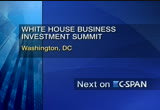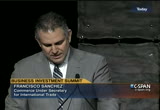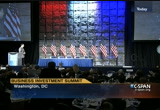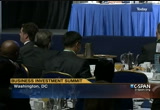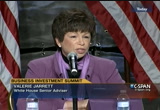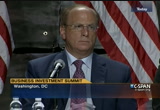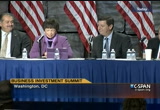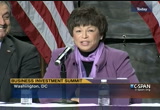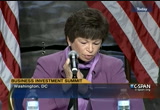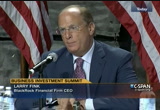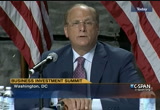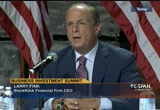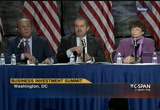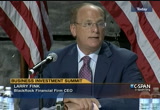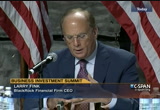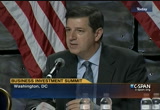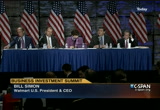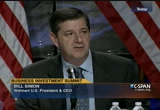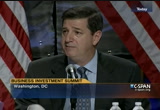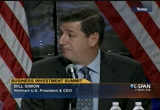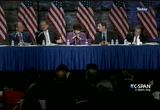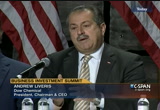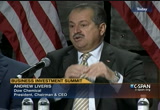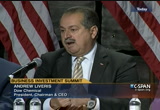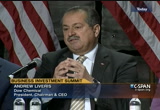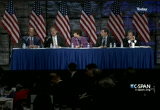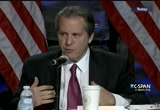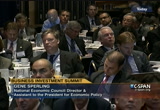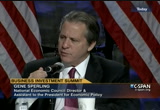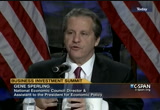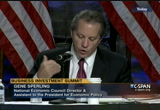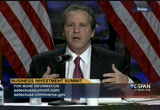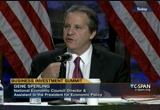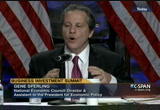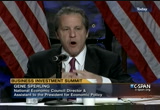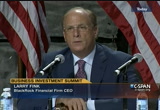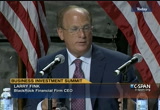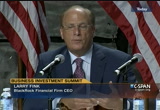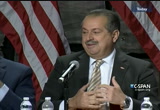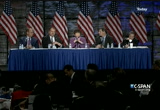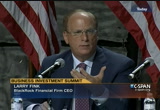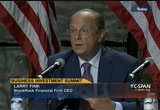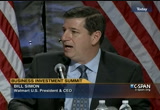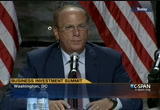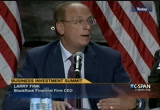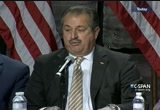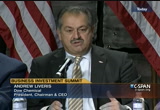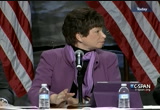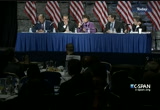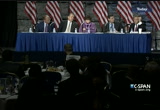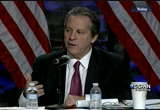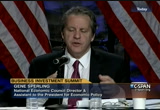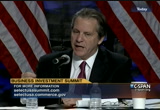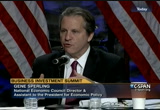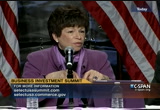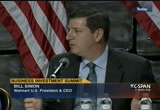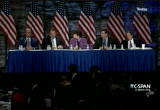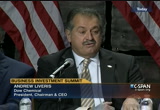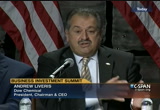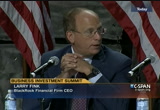tv U.S. House of Representatives CSPAN October 31, 2013 8:00pm-9:01pm EDT
8:00 pm
>> on c-span tonight, discussing foreign investment in the u.s.. there is a hearing on syria's civil war. primeter, the iraqi minister. at the commerce department investment summit, the ceos talk about the u.s. investment climate and the government policy on attracting foreign investment, some of those policies include immigration, the debt ceiling, and energy. it is moderated. [applause]
8:01 pm
>> good morning everyone. lou, thank you -- lew, thank you for your excellent remarks. thank you to both of them for their leadership. it has been outstanding for the subject matter we have before us these next few days. their insights as it applies to the business community are very valuable to all of us that are joining us today. we are off to a great start to what promises to be a gay -- great conference and agenda. thank you to all who has come great distances to be with us today. i am very pleased to announce our first panel that is entitled usa?hy select the perspectives on operating in the united states."
8:02 pm
this'll be a very informative and invaluable discussion. it is also my pleasure to introduce that moderator of this panel, an important member of president obama's white house team, valerie jarrett. a senior adviser to the president and a longtime confidant of the president. she oversees the office of andgement and affairs chairs the white house council on women and girls. she was the chief executive officer of the habitat company. baldry has held positions in both the public and private sectors and hails from chicago before coming to washington, d.c. lees give gentlemen, a warm welcome to valerie jarrett. [applause] good morning, everyone.
8:03 pm
you look fantastic out there. we are all delighted to be here. i would like to begin by congratulating a secretary who has truly hit the ground running since the apartment. has traveled all over the world and gave a party and everyone showed up. you showed up and we were surprised. i also want to give credit to former secretary and now an ofassador who was the brain -- two years ago. we stand up so we can welcome you. [applause] you will be hearing from president obama a little bit later today. let me say a few words about why the summit and why select u.s.a is so important.
8:04 pm
encouraging investment in the united states is important. the u.s. remains the largest economy in the world and the largest recipient of direct foreign investment. as we all know, the competition for your partnership and investment is fierce. the united states simply can no longer rely on being the biggest economy are the obvious choice. we have to work every day to do our very best. select u.s.a. is the result of the president broad commitment to making it easier to do business in the united states. we are centralizing resources at says secretary mentioned to give information to -- you need to market the u.s. marketplaces. we are also joined by representatives from state and local government. they are partners in this. you should leave here today with the resources and relationships that you need to make select u.s.a. work for you and for your
8:05 pm
businesses. put simply, we want your partnership and we will work hard to earn your trust and your confidence so that you do select the usa. i'm thrilled to be joined by a great panel business leaders who can offer their perspectives on why the united states in such a dynamic destination for your capital. first, let me introduce larry fink, the chairman and ceo of lackrock. he has been a great partner to the administration. benefitedwe have greatly from his advisement on the global economy. he is the largest asset manager in the world. his counsel and advice has been important over the last five years. in fact, larry convened a group of very large global investors several months ago. of this the beginning large conference.
8:06 pm
thank you for your leadership and for being here. please join him opening larry. [applause] -- please join me in welcoming larry. [applause] have another ceo. he spends a lot of time in washington. we see him almost every week. he is the kind of ceo who is not shy of giving his advice and counsel. he served on the president's counsel and was recently co- anyr of an advanced partnership. he is an important player. please join me in welcoming andrew. [applause] we are also joined by the president and ceo of walmart usa. we were closely with bill and walmart on a range of issues that are important to the president and our economy. this summer, they'll invited a
8:07 pm
secretary to florida where they thea concept of many of supplies were encouraging them to invest in the united states. he has been a partner with administration on a range of issues, including the first lady's let's move initiative. and looking to lamar for an opportunity for a job after people leave the military. -- and looking to walmart for an opportunity for a job after leaving the military. please welcome bill as well. [applause] lastly, i will introduce my buddy, gene sperling. he helped pull together this important forum. i also have to say he is the longest-serving director of the
8:08 pm
national economic council in our nations history. he served under two of the last four presidents. all ofhe brains behind the president's major economic initiatives that has been put in place since the president took office. he is a force to be reckoned with within the white house. he is known for coming in early and staying late and burning the midnight oil and has given his heart and soul to our country over many years. please welcome me -- please join me in welcoming gene. [applause] so, let's kick things off. i will start by asking each of and openings question about why businesses or investors should be bullish on opportunities here in the united states. larry, we will begin with you. can you give us your sense of prospects for the u.s. economy and why the united states is a good place for investment given the global opportunities. >> thank you.
8:09 pm
it is an honor to be here. i can answer that question in two parts. one is an investor who help companies come to the equity markets and bought markets. foremost, we are the most resilient capital market in the world. we have the safest capital market in the world. 10 years ago, a lot of people were pessimistic. 10 years later, we have witnessed more ipos than ever before. we are seeing young companies coming here and not just domestic companies. we see more international companies seeking to come here. the primary reason as and investor, we have much more confidence in the financial ,tatements of these companies especially young companies where we do not have a long history of or having strong
8:10 pm
and robust financial statements. you fill much more confident. it is sometimes so maligned in this country. it is absolutely wrong. companies are sticking to come to the united states to find sources of capital. investors worldwide are willing to invest in the u.s. market much more than other exchanges worldwide. realis a first in a unspoken issue related to the united states. even today, we had some large companies that were talking to the new york stock exchange for a listing that would be a real statement about the difficulties of investing overseas versus bringing their companies here and listing here in the united states. let me also turned to these companies probably most of you out there. we're the largest owner of equities worldwide. let me talk about the united
8:11 pm
states specifically. it makes us so constructive of the country today. first and foremost, we were the quickest to resolve our banking crisis. europe is going through a third round of stressing their banks. we did that for years ago. as a result of that, our banking system is as strong as ever. in fact, there is not enough demand for loans. that is one big change. you cannot say that in europe or in other parts of the country. we have the most robust to banking and loan market as well. second, the drag on our economy from housing despite great pains housing, we had over 5 million excess homes, to an
8:12 pm
economy where we will build millions of homes. he will add jobs and it will be a story of commerce for companies on the cell components to housing. i will add one other major component. small business builds because the major component of small business is in the form of construction. the third biggest reason is our energy. surprising that only a few years ago people did not realize the change in technology and what that means in terms of carbon and the refining of carbon. thatve gone from a nation was very dependent on importation of carbon to a nation that we will ultimately become an exporter of carbon in the future. is is going to be a major change. changing andico
8:13 pm
liberalizing their energy, it will only empower texas and other components of this country. i do believe having aced drunker mexico -- i do believe having a stronger mexico makes the u.s. stronger. let me also talk about a few things people do not talk about enough. that is the energy costs. the blackrock, we have two major data centers. one is in washington on the columbia river and one that we are building right now in buffalo, new york. we are paying approximately 3.5 cents per kilowatt. datahad to do these centers in europe, i would be paying $.18 per kilowatt in parts of germany and other parts of europe it is over it $.80 per kilowatt. here we are. we have cheaper energy. we have the cheaper cost of energy for manufacturing.
8:14 pm
the other thing where we spent a great deal of time is our educational system urge -- system. have more students country than any other in our educational system. why do they come here, it is not just the quality of education, but the type of education. i think some of the disadvantages of education globally, so many people are taught facts. this might work very well for i am notcores -- and trying to diminish that at all. i do believe the american style of learning should get more credit in the ability to be thoughtful and critical thinking. as an employer who this year we hired 1100 employees and the year before we hired 1100
8:15 pm
overyees, i would tell you 80% of the employees come from u.s. universities. we will continue to have that. as an employer and some of you has offices and 38 countries, the bulk of our employees comes from the united states and we are looking for people who know how to think and think creatively. >> thank you, larry. let shift to bill. from allst retailer over the world -- trying to increase the sourcing you're doing here in the united states. could you give us perspective of how and why that decision was made. >> sure. thank you, dollywood. worst of all, thank you national -- thank you, valeria. first of all, thank you. it is incredible time in the country and in this area.
8:16 pm
it is a math equation. it has never been more favorable for investment in the u.s.. we just heard about energy costs. that is one component. earlier decades led to migration of manufacturing outside the u.s.. it is now all in the favor. if you think about the math equation favors expansion, earlier this year, we made an announcement that we were going to increase our u.s. purchases by $50 billion. ist $50 billion in 10 years going to protect about $250 billion in additional spending over the next 10 years. that is a major commitment. it is done because of the map and economics. as you mentioned, we hosted a bit of a summit similar to this of all of the suppliers that we
8:17 pm
do and the state and local governments that we deal with. we brought everyone in orlando and kick this off. eight governors joined us. the really exciting part is that launched outcome that hundreds of projects. since that time, we have been able to announce initiatives that will add about 1600 jobs just to get the ball rolling. after the event today, we will make an announcement with three great companies investing in u.s. manufacturing today. hopefully we will keep an eye out for that. it is an exciting time and the opportunity is there for us. one of the points i want to make anything ever to take note is that there is a significant and distinct first mover advantage. there is a distinct urged mover advantage. as you begin to build capability and he get investment in a particular area, you get the component parts from it.
8:18 pm
we have seen manufacturing and investment grow that way. if you are an investor looking for opportunity to invest money, there is a distinct first mover in markets as we go forward. for our part, the largest retailer in the world and in the u.s., we believe and see the inner activity of the global economies. and vibrant u.s. economy is important to the global economy. investment in the building of the american middle class and that manufacturing sector will make us a more robust economy so we can trade better with partners around the world. finally, loss of efficiency would suggest with transportation costs increasing and the availability of inexpensive fuel and energy in that.s., capital markets
8:19 pm
are free and stable and the lowest interest rates that anyone can a member suggests that the time is now and immediate. as we think about where we're going and how we are going, we are pleased to be able to participate. walmart -- a certainty is important in how we deal with each other. it is important how we deal with business. what we can provide is a certainty of a purchase order or a contrast. countries look to establish manufacturing bases in the u.s.. we are changing our policies and making were longer-term so they can have a certainty to invest here. we have a team that is put in place and they are ready to serve and ready to do business. we appreciate being here and look forward to the rest of the panel. thank you. bill.nk you, andrew, speaking of manufacturing, something you know barely a lot about.
8:20 pm
you have advised us on a range of issues that would make the u.s. more conducive to investment and manufacturing. one example is corporate tax reform. we are reducing it even further for manufacturing and how that helps for additional investment. what you sense of think is special about the united states. , andank you, valerie everyone who are attending this incredible summit. team usa in the conversation we are having here. one thing that valerie did not mention in her introduction of me is that as an australian, global citizen that has been with a, any for cache that has been with a company for many that hasfor a companry a companyor -- with
8:21 pm
for many years -- smokestacks.s, that is yesterday's manufacturing. the notion that labor costs will drive manufacturing has become what everyone has believed. you didn't mention this, but i wrote a book "making it in america." looking at what other nationstates do is that they recognize and credible of the manufacturing value chain that the administration has in based -- embraced fully. will touch ongene it. where production goes, innovation follows. the ecosystem that we celebrate in this great country around universities and institutions and even government r&d, the
8:22 pm
,abs that are still there today 70% of all non-government r&d's are spent and the manufacturing sector for a reason. you learn the mistakes and you understand them. therefore the next generation product occurs from that. not in the was national conversation to the last several years. the putting it into the national conversation, we need to reverse the trend that we can keep innovation here. perspective, when i would go around the row, in 1990, china had -- last year, 42,500. it is not just china. it is germany and singapore and thailand. they compete as companies, these countries. for the united states to get this notion that it should be
8:23 pm
competing or business like a company dumped down the debate. it is about interaction between government and private sector and setting the rules of the you can be a gold medal olympian athlete. what will an athlete from team usa look like? the financial systems would be the very best. it means the nervous system and the brain needs to be the best. the innovation center. will he get around to talking build innovation clusters and ecosystems right across the country not with new money, but directing money to the a button private sector in a smart way. what is the brawn? what is a muscle? this newfound energy advantage of the united states and adding it to good use to allow the
8:24 pm
united states to become an export machine and to take not just liquids, but silence and in , andhe brains, if you like become gold-medal parts, team usa is there. as far as i am concerned as i travel around the world, where are the bright spots? it is here. wrong, therefore work together to get it right. advancedy short, manufacturing of the sustainable sensors ofns and robotics and the bio kind, that is all occurring at the intersections of markets and sciences. united states and the course of its entrepreneurial system and the course -- and the way that
8:25 pm
it teaches at schools of the way that our kids grow up in the system, to look at opportunity and to go at the answer and work humanw to reduce footprints on the planet, these are the things that make the united states attractive part of the roof to invest in. you can do it here. 70% of all of the r&d is done in the united states. 70%. not to say that it should be done elsewhere. i not united states is unbeatable for that. the dow is putting its money where its mouth is. $5 billion against -- value adding. we are putting thousands of jobs up in $100 billion in place for the united states that will create new jobs in the next several years. a lot of that will be exporting rains and a little bit abroad --
8:26 pm
brains and a little bit of brawn. thank you. >> thank you. [applause] >> i know one of your many strengths is looking at the long-term, sustainable growth of the economy. help the audience understand how in creating policies you think about the comments you heard this morning and how you make decisions accordingly? >> i think ever since president obama was first running for president, he had a focus on what you have to do to lay the foundation for the or and make the united states a magnet for job creation. i do think in 2011, there was a bit of a change in the following way. he started to see some of our major business consultants,
8:27 pm
mckinsey, others coming out with a message that was quite a change to their clients. the analysis on cost that has led us in the past to look at locations and those cost calculations have changed. what we will look at in the future over the next 10 years, which is what you should be looking for. the which productivity factor now has turned around and will favor the united states, number one. number two, the realization of the natural gas costs, that 50% lower costs. third, in 2011, there is a greater realization that perhaps are more hidden or uncertain costs and overly diffuse and remote supply chain. perhaps that was spurred by the natural disaster in japan, etc.
8:28 pm
all of the started leading to reconsideration. people were advising their companies and trying to make a focus that we should be looking at manufacturing locations likely look at r&d. it is not an industrial policy. it is an innovation strategy. that location matters and has significant spillover impacts. athink we felt that this was policy that the president supported. now there is more wind at our back. the president would be at his job's counsel were people are disagreeing and yet you hear from both labor and major ceos and they would say the u.s. might be the most competitive for location jobs and has been in two to three decades. policy wise,dent,
8:29 pm
to look and said this is a moment of opportunity, devon positive trend, put more wind at a morek -- to have positive trend, put more wind at its back. we have started and will soon announce second, third, fourth of our network manufacturing hubs. we have focus on higher education, all of the things that are important to stability and attracting jobs. we were successful in having a somatic fall in our deficit that our path is more stable than it was. we do think that more needs to be done. policies and cooperation from congress to implement to help make our -- us more competitive and more attractive. second, is how we organize ourselves and the messages we
8:30 pm
send, which we have more control over. of the thingsome the president is pushing right is comprehensive immigration reform. it would increase the need for labor many people say is critical to their decisions. this is a top priority of the is making sure our training programs are more so if you want to locate here there is someone who says, if you are unsure whether there is a particular skill need , we will work with you to make sure there is a partnership that works for you. area is to have what he calls a grand bargain on jobs
8:31 pm
to lower the corporate tax rates. and to strengthen the infrastructure so your supply chains can move more quickly. componentsmportant we have to do. we have to get of greater sense of stability. i guess you can say we want more --ufactured and last word less manufactured prices. we have not been at our best
8:32 pm
the last month, but i think the future looks brighter in painting a picture of stability. now, the thing that is under our control is the signals we send. we had to recognize there were places where the signal that the president wanted to send was not coming through. one or two high- profile cases by be sending a signal that we were not open for business. we want to make clear. this is not a seen a phobic nation. if you want to come here and make your fortune, played by the rules, and invest in the united states, creating jobs, we do not just tolerate it, we welcome you with open arms. a lot of motivations for this select usa conference was to in a very bold wait make that abundantly clear. secondly, how do we organize ourselves? the united states has generally organized itself in our embassies, etc., in ways that focus on commercial advocacy and export promotion. our efforts at recruiting in united states, and this goes back administration after administration of for decades has been more ad hoc. that is not good for us because we do not have an organized way of encouraging people who want investors to invest here, but not good for those who want to do it either because it can seem ad hoc. it is not clear who is going to hell. when the president comes today,
8:33 pm
what he will talk about is a major reform effort to, for the first time ever, have the united states make an economic priority the encouragement of foreign companies to have job-creating foreign direct investment in the united states. this is not just an empty phrase. they are working together with the white house economic team. what this will mean is in the 32 over 90%hat make up right now, for the first time ever there will be an organized team who will work together with will have as they one of their core missions for
8:34 pm
the first time encouraging and facilitating foreign direct investment in the u.s., and they will have one channel they will go to so when you are making a decision here you will have one shot stopping. you will have one place you can issues, look at is this state and local, federal issues, and when it is helpful to talk to someone in the white house, we will have a process for doing that. policy we arejor announcing today. you willyears from now see why people are wondering why we have not made this type of rotter usa reform. >> thank you for making that announcement. historically our investments
8:35 pm
come from europe. today we have people from africa, asia. i would ask the business leaders to respond to the comment. is there more we should be doing? do we need to change the strategy given there is an opportunity for more expanded investment that has historically been the case? >> i have the advantage of talking with eeo's worldwide. -- ceos worldwide.
8:36 pm
because of more technology companies from parts of europe have ana are looking to foothold in the united states today. we are not an accident. we expelave a problem, the problem and always undersell ourselves as a nation. also because of our capital markets. more are looking to add to our research facility.
8:37 pm
this is going to be a phenomenon in the heartland. it is certainly going to be a where wen in texas, have cheap energy. one of the largest manufacturers in india is building a plant in idaho right now because of cheap natural gas. i visited one of the largest egyptian companies recently, and they are building another plant because of this. every time i travel overseas i am asked continually, why aren't you more bullish? opportunitybiggest e see in the world.
8:38 pm
what i am i recognize doing. i am ceo of a global company really encouraging investment. when i go to another country they asked me to do the same. at the end of the day advantages sell themselves. you have got to channel those investments. partnership seen a as good as it is now. i would tell you, when i go see him, there is although mindset about cooperating, not just in those countries but the other way around. we have been talking about innovation, newfound advantages, the government systems and
8:39 pm
transparency and the fact that the rules are the rules. there may be dysfunctionality from time to time we have to overcome. you arewhy they say, the greatest country in earth, but you can't manage your self? what do you have to do to go to ?he next step to be team usa we have to make our incentives clearer. we have to remove this notion it is all about subsidies. everyone thinks it is a level playing field. it is not. establishing principles of free and fair market with mutual
8:40 pm
access, that is an american ideal we should be pushing as hard as we can to set the standard on trade. of gdp isinder 60% 70% is trade.but go toncourages us to where we will be treated fairly. the emerging-market companies can come to the united states and will be treating -- treated fairly. >> i was in south america, andpe, and asia last week, every government official is asking how we can create jobs. the one thing that is very clear, when you look at the trend in the united states, we all know the manufacturing refined thebeen so
8:41 pm
human element of manufacturing has been reduced hermetically. this creates social issues worldwide, but these are issues every country is facing right now. is because of rule of , because of advantages in cost of energy, and also, you look at our workforce, and if you look at wages, there has been a compression of wages worldwide where 10 years ago everyone spoke of places in the world where it was cheaper to manufacture. law, this isle of why more companies are trying to come here. is why i am asking every country today how can we create jobs?
8:42 pm
insecure.eeling >> we are as competitive as anyone in the u.s.. us or someoneut else. in a global interconnected world, efficiency would suggest consumption -- deficiency occur at the space of consumption. when we talk about growth in demand is going to absorb the consumption capacity that exists today. we're looking at is a fantastic opportunity, and we re very excited about it. we have an administration making effective moves to support policy decisions that will ncourage it. we have capital markets saying capital markets are ripe for it.
8:43 pm
they say manufacturing favors expansion in the u.s., and we have someone from the consumer market saying we have ready and willing buyers. i don't know what you could ask for to understand there is an opportunity that exists today to take action, so i am excited to be here. he mentioned immigration reform, and it is interesting, because we have seen an enthusiasmn terms of for comprehensive immigration reform. i wonder if you can say little bit about how that factors into our global competitiveness and the impact it would have in our economy. was meeting with one of the more important leaders in europe this past summer, and the leader said if the united states passes and immigration law, shame on
8:44 pm
the rest of the world because we are going to be the envy of the rest of the world. second, i do believe it would be dramatic in future growth rate of the united states. first and foremost we have 12 million people living in fear. if they have a path toward citizenship, think of the new houses that would be purchased. havef the difficulties we in trying to get visas for some of the smart foreigners graduating who are having a difficult time to be a permanent resident, may be to be a citizen here, so that process is going to make it much more advantageous to us, so it's not it'sa technology problem.
8:45 pm
a problem of technology companies. productive workers will be stimulating the economy and , and there'd,ople the immigration bill is going to be a standard that will set us as a nation, and that standard is going to drive more commerce. >> the business community because it sees gaps we are all filling in some way. it's not perfect, and it's very there are 600,000 jobs we cannot get enough
8:46 pm
candidates before. we are trying to get people in business. many companies are doing everything they can and not just at the phd masters level. we are trying to get the modern factory worker trained, the technically skilled person who can work with advanced sensors, all the things i said earlier. we are doing it ourselves. we are going to be working on rebranding the notion this is something our own up workforce
8:47 pm
should be excited about. you are right. the issue is we are not creating enough jobs. youth unemployment is a chronic issue in most countries. our education system needs to catch up. our immigration system needs to catch up. we can be the vanguard if we pass immigration reform and really get the flow of human and wherethis country they may come from, even australia, if we can get them in and really be part of the system , i can think of no more pressing issue for team usa than immigration reform. >> i would agree. think back on our history, every major growth we led byd has been
8:48 pm
immigrants. we are a nation of immigrants. if you believe in free enterprise, you have to believe in immigration and capability and shoppers and consumers immigration would bring that would fuel the next level of growth. i think as we evaluate going that would be a problem that has been for a long time unaddressed and could actually dampen opportunities that exist, so i am very pleased that is one of the topics that is going to be addressed in the next few months. absolutely a top priority. mentionedu have skills. this is something he has been working on for a long time. i would like jean to share a
8:49 pm
little bit in terms of your perspective of everything we .ave been doing president obama went to a school created between the city of new york and ibm. the goal is to get young people excited and passionate about math and science, technology, engineering, computer science, and one goal is particularly figuring out ways to get young girls interested, so if we can capture them when they are young and keep that passion going, they will fill those open jobs. >> the immigration discussion is a pertinent -- a perfect lead-in to this. the attitude some people might have in the past as to why some people would resist immigration
8:50 pm
or highly skilled immigrants coming here is some notion it is a zero-sum game. if a high skilled immigrant comes in that mean someone in the united states is going to do worse, but this conference we are having is the fact this is the world works, and the message the president has is if you cantion hire the people you need to fill the jobs you need you are more like lead to locate it here, and tot would be -- more likely located here, and that would be a plus. to the sense of us as an open arms country, the support very much goes to the support there is for foreign direct investment.
8:51 pm
people want to see the bottom line. what is the impact on job creation? we don't want to fill it simply through immigrants. we try to take a multi-faceted approach. we as a country don't do as well at getting all of our inulations interested science, technology, engineering, math professions they want, so you have to hit that at every approach. early, hitting that social pressure that makes they loses and then interest. encouraging people of minority communities to choose stem of the things we
8:52 pm
partnered very well is we find there is a certain amount of young people whom the idea of academic study does not grab them as much, but when they can go to a high school connected to a particular company where they are going to finish high school, have a degree, and be first in line for a particular job, it helps build that cool. one thing we are trying to do is build a pool of people getting the skills needed to fill the jobs you want filled. the second thing is our new secretary of labor has a great expression. he says we cannot have a training policy on the theme train and pray. the training has to start with understanding what are the needs, what is being demanded , and if private sector there is one thing the president will want to focus on, it is
8:53 pm
making sure all of our training programs start with our they demand driven? are they demand driven? are they talking to particular companies and understanding what the needs are in a particular the companyis siemens has actually been one of our partners, and this is important because it has geographic national strategy, but it is local. if you are in an area where you want to come but make sure there is enough skill needs there, the idea you can partner with the we will work, that with the community college on the curriculum and school base you need. for us that means we are actually increasing the skill base of the country, and that will benefit you but also them in their next jobs as well. that's something we need to do, but we could use that
8:54 pm
partnership and this kind of demand training could be tailored to the needs of her region. there is nothing the president would like more then for somebody to say, i will locate here if you will help ensure i have 300 more of a particular skilled workers here. say, great, wed will take on that assignment and work with you. i think that is going to take over some of the training for the next term. >> we are so fortunate to have so many folks from state and local government here. you mentioned we had a number of governors present. i would like you to share your thoughts about the importance of state and local government. you obviously are making decisions every day about where to put those based on demand,
8:55 pm
but i am sure also the welcome this of the state and local government has an impact as well . any stories for us? >> the decisions that can be made at the federal level are more policy and environmental climate decisions. the state and local decisions are really detailed driven rubber meets the road kind of offers. see has been fascinating to and watches the engagement from the states and governors particularly in the city of economic development leaders. they are competitive, aggressive, advocates for their own geographies, and it is interesting to watch, as we have had discussions with manufacturers and introduce them with the states with resources we are looking for. folks,e very competitive
8:56 pm
so seeing that is sort of encouraging. as jean said, they will do what they need to do to take care of haveequirements you might from a workforce capability or natural resource capability. we see that a lot, and we see some governors making decisions about that. if anyone has any questions, to give us aree call. andrew, you calm the country looking for places to invest. comb the country looking for places to invest. how is important is it for you? .> we are a community
8:57 pm
system taken the value of a community into other parts of the country and exporting the values from one place to another is only as good as the partnership one creates a local level. called something community advisor panels for decades. inre are people who can come and openly tell us how to improve. it wasn't that long ago we were smokestack industries and how to become sustainable manufacturers, you have to be in touch with your local communities. at the state level there are some states that are very pro- business and understand they are in the business of attracting business. they are in the business of providing jobs for their communities. the pace of business they have also adjusted.
8:58 pm
part of the problem i want to touch on, geography is long gone apart from natural resources is a statec du jour, so boundary or even a country boundary, in this world of fast decisions and incredible dynamic markets,he financial energy markets, you name it. how do you get everyone involved in decision-making at the pace of his miss? business? of iso think understanding this the job creation world, and it's not yesterday's jobs. we have to work with the union movements, work with all the jurisdictions and local regulators, but do it in a way
8:59 pm
that creates the next wave of opportunities for the community. there are some states that do it at her than others. we are in 40 states, so we should know. it is not all equal. one thing we do is making sure our partnership at the local level is not just advocacy because we create jobs but one of critique for self- improvement. >> larry, your perspective on state and local? >> we have a different perspective. it is a large investment in bonds, so our job is making sure is asocal community competitive as possible so they have a higher revenue base. a betterhem to be place for employment, so our dialogue is quite different from other analysts, but i can't say
9:00 pm
when we decided we needed it reallytacenter, was designed for two things. one, our citizens wanted another datacenter that was more green, so we had to look for more areas that were more reliant on hydro. had 20 different data centers, and the reason we selected buffalo, obviously working with the city but also because of expansion of area,lectricity from that so as i said earlier, this is a , so byortunity for us having the center we are saving 3 billion a year. the fact we are moving from datacenter spiritedly generated
97 Views
IN COLLECTIONS
CSPAN Television Archive
Television Archive  Television Archive News Search Service
Television Archive News Search Service 
Uploaded by TV Archive on

 Live Music Archive
Live Music Archive Librivox Free Audio
Librivox Free Audio Metropolitan Museum
Metropolitan Museum Cleveland Museum of Art
Cleveland Museum of Art Internet Arcade
Internet Arcade Console Living Room
Console Living Room Books to Borrow
Books to Borrow Open Library
Open Library TV News
TV News Understanding 9/11
Understanding 9/11
